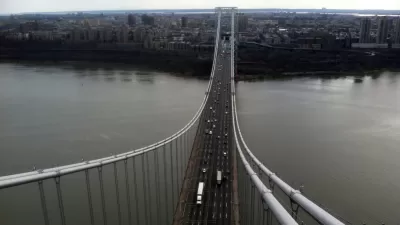Gas taxes and road and bridge tolls are not very popular, but important nonetheless. Gov. Matt Bevin (R) will sign a bill that prohibits tolls on a new Ohio River bridge, and might also endanger federal funding.
Like Gov. Matt Bevin's promise to roll back the Medicaid expansion under the Affordable Care Act that occurred under his Democratic predecessor, Governor Steve Beshear, this decision will undoubtedly prove popular as a political move, but like the roll back of Medicaid, it could prove dire from a financial perspective.
"Gov. Matt Bevin will support legislation his predecessor, Gov. Steve Beshear (D), had vetoed for its ban on tolls to help build a new Ohio River bridge" known as the Brent Spence Bridge project, writes Scott Wartman for the Cincinnati Enquirer. The bill is in the Senate having cleared the House on Feb. 11
The prohibition on Ohio River bridge tolls are contained in House Bill 309, sponsored by Rep. Leslie Combs, D-Pikeville, and Majority Caucus Chair Sannie Overly, D-Paris, known as the public-private partnership (P3) bill.
"The bill would expressly prohibit the authorization of tolls 'for any project involving the interstate highway system that connects the Commonwealth with State of Ohio,' which would include the proposed $2.6 billion replacement of the Brent Spence Bridge connecting Northern Kentucky and Ohio," according to the Lane Report. "Opposition to tolls for the bridge project hampered the passage of P3 legislation in 2015."
"If tolls would be enacted, it would be both on the current bridge, which would be rehabilitated, and the new bridge built alongside it," clarifies Wartman.
The bill stood no chance during the Beshear administration. Beshear insisted tolls needed to be part of the discussion in renovating and building a new Brent Spence.
"It is imprudent to eliminate any potential means of financing construction of such a vital piece of infrastructure that serves not only the Commonwealth and the state of Ohio but also the eastern United States," Beshear wrote in his veto of the bill.
So, if not tolls, where will funding come from? That's the question the Kentucky Legislature, and the new governor, will have to answer if they want to get federal funds for the $2.6 billion project.
"The toll ban might delay the Brent Spence project but does not kill it, said Mark Policinski, chief executive officer of the Ohio-Kentucky-Indiana Regional Council of Governments," adds Wartman.
Bevin will need to come up with an alternative source of money, he said, and soon. If the region wants to win any federal money, Ohio and Kentucky will need to come up with a financing plan to beat out other states, Policinski said. That's because competition is steep for federal money.
Perhaps Bevin will change his mind, as he did with the Medicaid roll back, instead agreeing to a "Medicaid overhaul." However, if the P3 bill passes with the no-toll clause in and he doesn't veto it, there's no going back.
Hat tip to AASHTO Daily Journal Update
FULL STORY: Bevin: I'll sign bill banning tolls for new bridge

Planetizen Federal Action Tracker
A weekly monitor of how Trump’s orders and actions are impacting planners and planning in America.

Maui's Vacation Rental Debate Turns Ugly
Verbal attacks, misinformation campaigns and fistfights plague a high-stakes debate to convert thousands of vacation rentals into long-term housing.

San Francisco Suspends Traffic Calming Amidst Record Deaths
Citing “a challenging fiscal landscape,” the city will cease the program on the heels of 42 traffic deaths, including 24 pedestrians.

Defunct Pittsburgh Power Plant to Become Residential Tower
A decommissioned steam heat plant will be redeveloped into almost 100 affordable housing units.

Trump Prompts Restructuring of Transportation Research Board in “Unprecedented Overreach”
The TRB has eliminated more than half of its committees including those focused on climate, equity, and cities.

Amtrak Rolls Out New Orleans to Alabama “Mardi Gras” Train
The new service will operate morning and evening departures between Mobile and New Orleans.
Urban Design for Planners 1: Software Tools
This six-course series explores essential urban design concepts using open source software and equips planners with the tools they need to participate fully in the urban design process.
Planning for Universal Design
Learn the tools for implementing Universal Design in planning regulations.
Heyer Gruel & Associates PA
JM Goldson LLC
Custer County Colorado
City of Camden Redevelopment Agency
City of Astoria
Transportation Research & Education Center (TREC) at Portland State University
Jefferson Parish Government
Camden Redevelopment Agency
City of Claremont




























